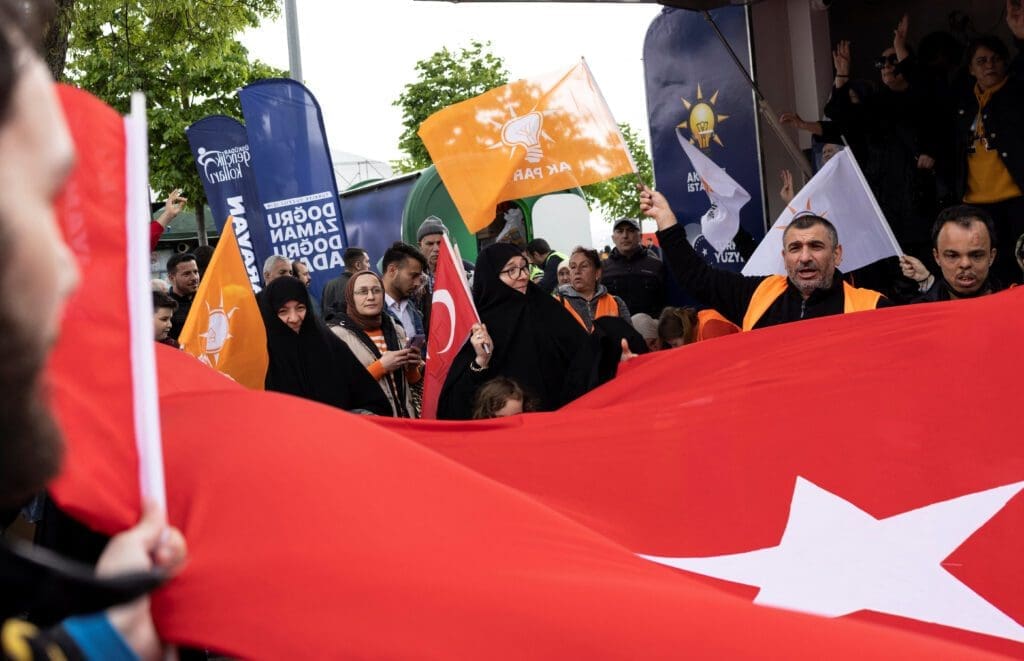On May 14, Türkiye will hold its most consequential elections in decades, with implications that extend well beyond its borders. For 21 years, Recep Tayyip Erdogan has dominated the country’s politics, reshaping its identity and outlook at home and abroad, while becoming the most recognizable Turkish politician on the global stage in nearly a century. Along the way, however, Erdogan’s leadership style and the politics of his Justice and Development Party (AKP) have changed dramatically. An early emphasis on restricting state power through progressive reforms has transformed into preserving the unchecked power of the state, while a prior embrace of inclusiveness and cooperation with other social and political streams has given way to a more introverted and nationalist approach—alienating segments of the leader and party’s once broad support base.
This month, Erdogan faces the most serious challenge of his political career, in the form of a broad, ideologically diverse opposition alliance seeking to end his two-decade rule. So, what has led to this moment of vulnerability? And what would a change in leadership mean for Turkish foreign policy and the MENA region?
Why is Erdogan Vulnerable?
These are the first elections since 2002 in which Erdogan has found himself at serious risk of losing power. They come in the wake of a devastating earthquake and in the context of mounting economic woes, with voters facing rampant inflation, increasing unemployment and a fear for the future.
Cracks in the AKP’s dominance of Turkish politics had already been on display in municipal elections three years ago, when the Republican People’s Party (CHP) won several major cities including Istanbul and Ankara. Those cracks deepened in March, when six opposition parties ranging from the secularist CHP to religious AKP spinoffs all agreed to back the CHP’s leader, Kemal Kilicdaroglu, as a presidential candidate. The Nation Alliance’s support for Kilicdaroglu marked the consolidation of a united front against Erdogan, stirring opposition hopes of putting an end to the AKP’s uninterrupted rule.
Apart from candidates from the “Good” party (IYI), all the alliance’s parliamentary candidates are running on CHP lists. This is notable as some member parties have a history of conflict with the staunchly secularist CHP, the party of modern Türkiye’s founder Mustafa Kemal Ataturk. Joining CHP lists indicates that they have put aside these differences for the sake of toppling the AKP. If the coalition wins, the new government would be composed of a diverse mix of secularist, nationalist, liberal, conservative, and religious political actors. The fact that such an assorted group was able to form an alliance at all has led many political observers to conclude that they have a credible chance of defeating the AKP.
Not all of the AKP’s rivals have joined the coalition, however. The left-wing, pro-Kurdish Peoples’ Democratic Party (HDP) is fielding its own parliamentary candidates to ensure a strong presence in the legislature. The absence of a Kurdish presidential contender is also striking, given that now-imprisoned Kurdish political leader Selahattin Demirtas won over eight percent of the popular vote in the 2018 presidential election. While the HDP was not included in the political alliance that Kilicdaroglu leads, Demirtas has voiced support for the CHP leader, who has adopted a softer line on issues related to Kurdish cultural and political liberties. Additionally, Kilicdaroglu’s stance on the freedom to publicly display religious symbols, such as the headscarf, has helped him cultivate a positive relationship with Türkiye’s pious population, including certain political Islamists.
Recent elections have demonstrated strong public support for unity among opposition forces. The opposition failed to beat Erdogan in 2018 presidential elections in part because it put forward multiple candidates. By contrast, opposition victories over the AKP in March 2019 municipal elections, including in some of the party’s strongholds, owed largely to the strategy of agreeing on joint candidates.
But while their unity behind a single contender may tip the scales in the opposition’s favor, beating Erdogan remains a towering challenge. He is an experienced politician who has weathered numerous political storms since 2002. Erdogan has strong and genuine support from a fair segment of the electorate, and despite the momentum of the main opposition alliance, which has held rallies across the country, the result remains highly unpredictable. For one thing, voters are often unwilling to disclose their true preferences to pollsters. While many AKP voters feel discomfort with the party, it is impossible to know if that will translate into defections toward the other camp. Only the election’s final results will reveal whether Erdogan’s base has meaningfully diminished or not.
The opposition also has significant weaknesses. Analysts have noted that it lacks a clear program to tackle Türkiye’s pressing economic woes. Its pledges on foreign policy are still abstract, short on detail, and untested in the complex reality of the multipolar world. And its campaigning is hobbled by limited visibility in the mainstream media, most of which is under government control and intense political pressure.
Indeed, the current government’s heavy-handed approach to dissent has caused growing concern about the state of Türkiye’s democracy in general. The country has witnessed an intensifying crackdown on the media, civil society, and opposition political figures through arrests, and even the use of flimsy terrorism charges to silence opposing voices. Sweeping constitutional changes in 2018 centralized power within the presidency and scrapped safeguards to ensure a fair and effective separation of powers between the executive, legislative, and judicial branches of government.
These troubling trends also have implications for Türkiye’s standing abroad. It will be exceedingly difficult for the country to sustain its role as a major regional investor, mediator and expatriate hub if the foundations of its democratic system continue to erode.
Türkiye and its Neighbors
Erdogan’s departure could fundamentally alter the ways in which Türkiye interacts with its international partners, from adjustments in its diplomatic methods to policy changes and realignments. This would have major consequences for the country’s role on the world stage. The nature of these changes would depend on a complex multitude of factors, but reasonable projections can be drawn from the statements of the Turkish opposition alliance.
The six-party coalition in January issued a note outlining its policies, emphasizing “institutionalism” over “personal interest” in foreign policy. The coalition’s members have called for a return to decision-making shaped by consultation, moving away from Erdogan’s highly personalized approach. Other public statements reveal a mix of populist and Western-oriented stances, arguing for a more balanced, less aggressive foreign policy that prioritizes Türkiye’s relations with its old friends: Europe, the U.S. and NATO. The opposition also wants to return Syrian refugees to their country and minimize Ankara’s engagement there.
All this is consistent with past positions of the CHP and IYI. They have long criticized Erdogan’s foreign policy, particularly his confrontational stance toward the West, his close relationship with Russia, and his opaque dealings with Gulf countries, as well as Türkiye’s military presence in Somalia and Qatar, and interventions in Syria and Libya.
By contrast, Erdogan is confident in his foreign strategy, which he believes has made Türkiye more autonomous and given it greater influence in the Middle East and beyond. Erdogan has consistently adopted an assertive and independent stance, seeking to project Türkiye’s influence and protect its interests, rather than simply following the lead of its traditional Western allies such as the U.S. and Europe. Erdogan’s supporters argue that this approach has given Ankara more flexibility in pursuing its goals abroad, particularly in the Middle East and Africa, where Türkiye has boosted its status as a regional power. Türkiye has also developed its defense industry, reducing its dependence on foreign suppliers and enabling it to become a weapons exporter in its own right—notably of drones.
But all this, particularly growing ties with Russia and China, has caused concerns among Türkiye’s NATO allies. Its relations with its largest trading partner, the European Union, have long been strained due to the suspension of Türkiye’s EU membership talks and other political tensions.
The prospect of a post-Erdogan government could change all this. Countries that have relations with Türkiye that have benefited from his personalized approach to foreign policy would have to reorient their posture toward a new government with new institutional channels and different policy-making methods. Opposition parties may seek to normalize ties with the West, but it remains to be seen whether they would attempt to maintain or undo Türkiye’s position as a unique regional actor, arguably Erdogan’s biggest legacy. A country beholden to a broad political coalition with diverse interests and ideologies could be very different from one that has been largely shaped by single man over two decades. But all this remains speculative until the results are in from perhaps the most consequential Turkish election in a generation.
The opinions expressed in this article are those of the author and do not necessarily reflect the views of the Middle East Council on Global Affairs.


